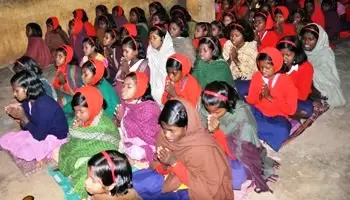The fab four that has changed the lives of people in Sanbahali and Junapani

01-April-2011
Vol 2 | Issue 13
Change is in the air. Even in areas forgotten by the rest of India. Nothing perhaps underlines this more than the fact that young tribal women in rural Orissa are going against tradition, breaking taboos and stepping out as teachers. In the process, they are transforming the social landscape and exercising greater control over their lives.
This is a story from Sanbahali and Junapani, two nondescript villages situated on the 3,000 square foot plateau in the Sunabeda sanctuary area of Nuapada district. The community here comprises 519 families of the Chakutia Bhunjia tribe. People are mainly dependent on minor forest produce and shifting cultivation (land is cultivated temporarily and then abandoned) to eke out a living. Regular jobs are not an option. Even if they did opt for work under the Mahatma Gandhi National Rural Employment Guarantee Act (MNREGA), they would have to travel 60 kilometres to the nearest work site.
It is in this scenario that four young women - Triveni Chatria, Chandini Chatria, Jayashree Jhankar and Laila Majhi - are daring to dream. They are working as teachers in an ashram school run by the Chakutia Bhunjia Development Agency (CBDA), a local development agency. Every month, they get a salary of Rs 5,000.
 |
|
Towards empowerment: Children of Sanbahali and Junapani are all set to follow in the footsteps of Triveni Chatria, Chandini Chatria, Jayashree Jhankar and Laila Majhi and get their rightful education (Photo: Women's Feature Service)
|
"Earlier we were only four girls who had passed matriculation. Now we are at least 15," says Chandini, 18. Achieving this may not be a big deal for girls living in towns, but it means a lot in a community that believes in early marriage and follows age-old beliefs. Girls here are generally not allowed to wear blouses, petticoats or don 'chappals' (open footwear), and once they attain puberty, they are not allowed to visit the homes of their relatives.
Triveni puts it this way, "To achieve what we have so far has caused a lot of trouble for us and our families. By working as teachers we have gone against tradition." As the oldest of the four, Triveni teaches students of Classes Six and Seven. The other three are teaching in the primary section of the school.
The hurdles they faced in this journey of self-discovery were both similar and different. They all faced ostracism by the community for three years, because they not only dared to wear 'chappals' but went out of the village and enrolled themselves in a residential high school at Komna, some distance away.
Recalls Jayashree, "Till Class Five in the local primary school, I used to wear a sari without blouse. But then I had to switch over to the school uniform and found wearing my earlier dress very uncomfortable." Once she broke with tradition by wearing footwear and the school uniform, senior members of her community began to threaten her parents with social boycott. "My parents were scared but I pleaded with them and fortunately they agreed to support me," she says.
While Triveni and Chandini could also convince their parents, Laila was not so lucky. For many days nobody spoke to her within her household, and because she wore chappals she was not allowed inside the kitchen. But the young girl held firm to her decision to study. When she failed to convince her parents, she went on a hunger strike. Being the only child, her parents had no option but to finally relent.
Today, Laila's parents realise that they were wrong. Their daughter is now an earning member of the family and her mother no longer has to go into the forest to collect minor forest produce to keep the family going. Says Kumudini, Laila's mothe: "Laila is our only child and I feel proud of her as she helps to shoulder our financial burdens." The others, too, are contributing to their families in remarkable ways.
Apart from teaching in the village ashram school, these girls along with the boys, who have completed their matriculation have formed a regional resource group. They meet once a month and discuss various local concerns. They also campaign for girls' education in other villages.
According to Himanshu Mahapatra, the CBDA development officer, changes in attitude and lifestyle are crucial for any social change. "We are trying to make this community understand that they should cooperate with us and discard old customs and superstitions in order to improve their lives. But the government cannot do this by itself. That's why I am happy that these girls have managed to bring about many changes in attitudes among people here. They have been able to achieve over the last three or four years what we could not achieve for the last two decades."
Women's Feature Service
















